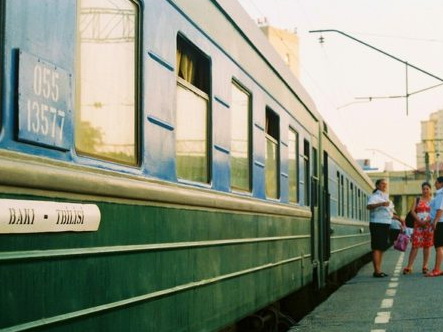The South-West Transport Corridor Project and the Geopolitical Reshaping of the South Caucasus

By: Fuad Shahbazov
Baku hosted the first joint gathering of the heads of the railway administrations of Iran, Azerbaijan, Georgia, Ukraine and Poland, on June 19. The meeting was dedicated to the newly-launched “South-West Transport Corridor,” which links into the broader Trans-Caspian International Route project launched in 2016.
The event concluded with the signing of a new joint protocol that envisages expanding cooperation opportunities along the so-called “South-West” route (Iran–Azerbaijan–Georgia–by ferry across the Black Sea–Ukraine–Poland) in order to optimize cargo transportation and increase transit capacity. Reportedly, the next joint meeting of the working group will be held in Odesa in September 2017 (Trend, June 19).
The coordination work of the project was assigned to Azerbaijan Railways CJSC. “The Coordination Council on the South-West route will be located in Baku—this is another advantage for us. The working group for the project will operate in Iran. We will try to negotiate, unite joint efforts, so that this transport corridor will earn and bring profit, in particular to Azerbaijan,” said Javid Gurbanov, the chairman of Azerbaijani Railways (CBC, June 20).
As part of the already-launched Trans-Caspian International Transport Route (TCITR), the South-West corridor will also involve such countries and regions as India, Pakistan, Southeast Asia and the Persian Gulf. The total length of the South-West corridor will be 7,654 kilometers. According to estimates, cargo delivery via the new railway will take 15 days (Sea-news.az, June 20).
.png)
South-West Transport Corridor (Source: financialtribune.com)
Explicitly recognizing the deep crisis in its oil market due to chronically low global prices, Azerbaijan is seeking opportunities to increase its role as a regional transit hub. As such, Baku is investing in local and international transport projects that gather several foreign countries together.
Azerbaijan is a natural crossroads for growing continental land-based trade, and its geostrategic location is key to connecting the transportation networks and markets of Europe, Asia, the Middle East and the Mediterranean region. In this regard, Baku has already voiced strong interest in joining the ambitious North–South Transport Corridor (with a total length of 7,200 km), which stretches from Indian ports to Iran, Russia, Central Asia, all the way to Europe (see EDM, April 24).
Thus, Azerbaijan has positioned itself to accommodate the growing transit traffic from India, China, South Asia and Central Asia.
Clearly, Azerbaijan is conscious of the importance of being a key link in the various international transit corridor projects that pass through the South Caucasus region. Thus, Baku has endeavored to involve more foreign countries, as well as investments, in order to increase its impact as a transit hub. Recently, China Communications and Transportation Association signed a memorandum of cooperation with Azerbaijani Caspian Shipping CJSC, allowing the latter to become a member of the TCITR corridor (Trend, June 14). The trans-Eurasian TCITR route (of which the North-West Corridor is a key part) makes use of Azerbaijani, Georgian, Kazakhstani, Turkish and Ukrainian seaports. Simultaneously, the TCITR project itself has engendered a new quadrilateral cooperative relationship: of Azerbaijan, Georgia, Ukraine and Kazakhstan (Trend, March 27).
In total, Azerbaijan has invested about $20 billion in the last several years to develop its transport infrastructure, build new highways and seaports, and reconstruct domestic railway lines (Report.az, November 25, 2016). Alyat, the new major seaport south of Baku, became operational in 2015. The Alyat port is located on a 400-hectare plot, of which 100 have been allocated to the Alyat International Logistics Center; a further 50–100 hectares have been dedicated to the development of a Free Economic Zone (Abc.az, August 7, 2008).
Azerbaijan sees the newly proposed South-West transport route as another means of diversifying its economy and reducing the country’s dependence on energy exports. The transit project’s participating countries predict that 200,000 tons of cargo will be shipped along this corridor by the end of 2017.
Although the official protocol on this transit project was signed in June 2017, the Azerbaijani media claims that Tehran, Baku, Tbilisi and Kyiv signed an initial agreement already in 2016 to potentially divert up to 10 million tons of Europe-bound goods from India to this path. Reportedly, the South-West Transport Corridor is an “economically viable” option for shipping up to 72 million tons of goods from India to Europe and 25 million tons in the opposite direction every year (Financial Tribune, June 21).
For now, plans exist to eventually increase the annual transit capacity along this route to 20 million tons (CBC, June 20).
The South-West Transport Corridor promises to ensure smooth and secure access to import and export markets for landlocked Central Asian countries. And thanks to this project, Azerbaijan is positioning itself as an important gateway for delivering their goods to the rest of the world. In light of this, Azerbaijan can be expected to further increase its investments in developing similar trans-regional transit projects in future, including the construction of new railway connections with Iran, Georgia and Turkey, linking Europe with the East.
Fuad Shahbazov is a foreign affairs analyst at the Strategic Research Center of Azerbaijan Republic. He is mainly focused on Russian foreign and military policy, and the South Caucasus.














